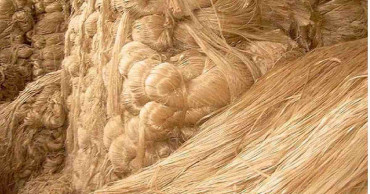green alternative to plastics
'Golden fibre' no longer holds glitter for Khulna jute farmers
A major cash crop for over three million small farm households in Bangladesh, jute is no longer considered a 'golden fibre' in Khulna. Unfavourable weather, low production and lack of government support have forced many farmers in the country's southwestern district to turn away from the crop in the past couple of years.
One of the most affordable natural fibers, jute is a biodegradable product used for making carpets, ropes and bags. The United Nations has long been advocating the use of jute products as a green alternative to plastics to help save the environment.
Read: BUILD explores producing paper pulp from whole jute plant
And at a time when Prime Minister Sheikh Hasina's government seeks to diversify exports to help the country tide over the Covid-induced economic crisis, jute farmers in Khulna say exports to countries, including India, Pakistan and China, are likely to take a hit this year. India and Pakistan are Bangladesh's two largest markets for raw jute exports.
Farmers say cultivating jute is backbreaking work as the crop takes eight to 10 months to mature. And once the crop is ready, it has to be cut and soaked in water. Subsequently, jute has to be separated, dried and pressed into bales.
Read: International tender called for reopening closed jute mills: Jute Minister
"Last year, Khulna farmers suffered huge crop loss due to Cyclone Amphan and consequent flooding. There was also no government support as such. This year, jute production has been hit in the district and adjoining areas due to hostile weather. So, it will not be possible for us to export the desired quantity of raw jute to India, Pakistan and China," says a farmer.
4 years ago

